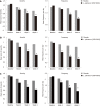Clinical trial: Lactobacillus plantarum 299v (DSM 9843) improves symptoms of irritable bowel syndrome
- PMID: 22912552
- PMCID: PMC3419998
- DOI: 10.3748/wjg.v18.i30.4012
Clinical trial: Lactobacillus plantarum 299v (DSM 9843) improves symptoms of irritable bowel syndrome
Abstract
Aim: To assess the symptomatic efficacy of Lactobacillus plantarum 299v (L. plantarum 299v) (DSM 9843) for the relief of abdominal symptoms in a large subset of irritable bowel syndrome (IBS) patients fulfilling the Rome III criteria.
Methods: In this double blind, placebo-controlled, parallel-designed study, subjects were randomized to daily receive either one capsule of L. plantarum 299v (DSM 9843) or placebo for 4 wk. Frequency and intensity of abdominal pain, bloating and feeling of incomplete rectal emptying were assessed weekly on a visual analogue scale while stool frequency was calculated.
Results: Two hundred and fourteen IBS patients were recruited. After 4 wk, both pain severity (0.68 + 0.53 vs 0.92 + 0.57, P < 0.05) and daily frequency (1.01 + 0.77 vs 1.71 + 0.93, P < 0.05) were lower with L. plantarum 299v (DSM 9843) than with placebo. Similar results were obtained for bloating. At week 4, 78.1 % of the patients scored the L. plantarum 299v (DSM 9843) symptomatic effect as excellent or good vs only 8.1 % for placebo (P < 0.01).
Conclusion: A 4-wk treatment with L. plantarum 299v (DSM 9843) provided effective symptom relief, particularly of abdominal pain and bloating, in IBS patients fulfilling the Rome III criteria.
Keywords: Abdominal pain; Clinical trial; Irritable bowel syndrome; Lactobacillus plantarum 299v; Probiotics.
Figures




References
-
- Brandt LJ, Chey WD, Foxx-Orenstein AE, Schiller LR, Schoenfeld PS, Spiegel BM, Talley NJ, Quigley EM. An evidence-based position statement on the management of irritable bowel syndrome. Am J Gastroenterol. 2009;104 Suppl 1:S1–35. - PubMed
-
- Mertz HR. Irritable bowel syndrome. N Engl J Med. 2003;349:2136–2146. - PubMed
-
- Quigley EM, Flourie B. Probiotics and irritable bowel syndrome: a rationale for their use and an assessment of the evidence to date. Neurogastroenterol Motil. 2007;19:166–172. - PubMed
Publication types
MeSH terms
LinkOut - more resources
Full Text Sources
Other Literature Sources
Medical

